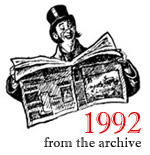
A Pragmatic Look at the New Secularism
RORTY, FISH & SAID
A new secularism, what might be called “postmodernist secularism,” has become a defining characteristic of today’s “cultural Left” in academia, which overlaps but is not identical with any political Left. Prominent cultural leftists such as Edward Said, Stanley Fish, and Richard Rorty disagree about the political implications of their secularism — for Said they are revolutionary, for Fish nonexistent, for Rorty reformist — but the rejection of transcendence provides a badge of identity for the cultural Left as a whole. Postmodernist secularism differs from earlier versions in some important ways; unlike old-fashioned secularists like Sigmund Freud, who substituted faith in reason for religious faith, contemporary secularists offer a generalized skepticism whose only consolation for the loss of belief is the vastly more important role which academic critics assume in a world where there is nothing — especially nothing transcendent — beyond the text, and everything is a text. In the words of the late Paul de Man, “the bases for historical knowledge are not empirical facts but written texts, even if these texts masquerade in the guise of wars or revolutions.”
Those who think of Edward Said as a spokesman for the Islamic world may be surprised to know that he describes himself as a “secular critic.” His collection of essays The World, the Text, and the Critic begins with an introduction defining “secular criticism” and ends with an attack on “religious criticism,” which Said sees as the main obstacle to communication. Said closes the book with this assertion: “How their discourse can once again collectively become a truly secular enterprise is, it seems to me, the most serious question critics can be asking one another.” What Said objects to is not merely religion itself but what he considers the religious way of thinking, which he finds embodied in “grand ideas and their discourse.” He worries that
impossibly huge generalizations like the Orient, Islam, Communism, or Terrorism play a significantly increased role in the contemporary Manichean theologizing of “the Other,” and this increase is a sign of how strongly religious discourse has affected discourse pertaining to the secular, historical world.
Said believes that a “secular” approach to Middle East politics in particular is necessary, since absolute claims, founded on religious certainties, make dialogue impossible. When Said argues that the suffering and reality of to the Palestinians need to be taken as seriously as that of the Jews, he is on solid ground. One may agree as well that a belief that God is on one’s side has often justified acts that otherwise would be condemned.
However, Said’s secularism goes far beyond his persuasive arguments on behalf of the Palestinians and against religious tribalism. His secularism leads him not merely to oppose the policies of Israel but to reject Zionism as racism and renounce Judaism itself as a subject of serious inquiry. Said’s secularism goes even further. Making one of those “impossibly huge generalizations” he considers the hallmark of religious discourse, Said asserts that culture in general is not worthy of respect as a possible source of truth but instead should be viewed as merely “a massive body of self-congratulating ideas.” Given the intertwining of religion and culture, it is not surprising that those who view religion with contempt find little worth salvaging in the human cultural heritage, whether it is explicitly religious or not. The road is thus opened to cynicism and nihilism.
You May Also Enjoy
The evisceration of eucharistic theology leaves gaping holes in other parts of Catholic life and praxis.
Just as historians crank out “revisionist” history, theologians remake the image of Jesus in order to reshape everything from doctrine to architecture.

